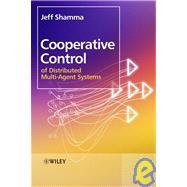
Note: Supplemental materials are not guaranteed with Rental or Used book purchases.
Purchase Benefits
Looking to rent a book? Rent Cooperative Control of Distributed Multi-Agent Systems [ISBN: 9780470060315] for the semester, quarter, and short term or search our site for other textbooks by Shamma, Jeff. Renting a textbook can save you up to 90% from the cost of buying.
| Introduction | |
| Dimensions of cooperative control | |
| Why cooperative control? | |
| Dimensions of cooperative control | |
| Future directions | |
| Acknowledgements | |
| References | |
| Distributed Control and Computation | |
| Design of behavior of swarms: From flocking to data fusion using microfilter networks | |
| Introduction | |
| Consensus problems | |
| Flocking behavior for distributed coverage | |
| Microfilter networks for cooperative data fusion | |
| Acknowledgements | |
| References | |
| Connectivity and convergence of formations | |
| Introduction | |
| Problem formulation | |
| Algebraic graph theory | |
| Stability of vehicle formations in the case of time-invariant communication | |
| Stability of vehicle formations in the case of time-variant communication | |
| Stabilizing feedback for the time-variant communication case | |
| Graph connectivity and stability of vehicle formations | |
| Conclusion | |
| Acknowledgements | |
| References | |
| Distributed receding horizon control: stability via move suppression | |
| Introduction | |
| System description and objective | |
| Distributed receding horizon control | |
| Feasibility and stability analysis | |
| Conclusion | |
| Acknowledgements | |
| References | |
| Distributed predictive control: synthesis, stability and feasibility | |
| Introduction | |
| Problem formulation | |
| Distributed MPC scheme | |
| DMPC stability analysis | |
| Distributed design for identical unconstrained LTI subsystems | |
| Ensuring feasibility | |
| Conclusion | |
| References | |
| Task assignment for mobile agents | |
| Introduction | |
| Background | |
| Problem statement | |
| Assignment algorithm and results | |
| Simulations | |
| Conclusions | |
| Acknowledgements | |
| References | |
| On the value of information in dynamic multiple-vehicle routing problems | |
| Introduction | |
| Problem formulation | |
| Control policy description | |
| Performance analysis in light load | |
| A performance analysis for sTP, mTP/FG and mTP policies | |
| Some numerical results | |
| Conclusions | |
| References | |
| Optimal agent cooperation with local information | |
| Introduction | |
| Notation and problem formulation | |
| Mathematical problem formulation | |
| Algorithm overview and LP decomposition | |
| Fixed point computation | |
| Discussion and examples | |
| Conclusion | |
| Acknowledgements | |
| References | |
| Multiagent cooperation through egocentric modeling | |
| Introduction | |
| Centralized and decentralized optimization | |
| Evolutionary cooperation | |
| Analysis of convergence | |
| Conclusion | |
| Acknowledgements | |
| References | |
| Adversarial Interactions | |
| Multi-vehicle cooperative control using mixed integer linear programming | |
| Introduction | |
| Vehicle dynamics | |
| Obstacle avoidance | |
| RoboFlag problems | |
| Average case complexity | |
| Discussion | |
| Appendix: Converting logic into inequalities | |
| Acknowledgements | |
| References | |
| LP-based multi-vehicle path planning with adversaries | |
| Table of Contents provided by Publisher. All Rights Reserved. |
The New copy of this book will include any supplemental materials advertised. Please check the title of the book to determine if it should include any access cards, study guides, lab manuals, CDs, etc.
The Used, Rental and eBook copies of this book are not guaranteed to include any supplemental materials. Typically, only the book itself is included. This is true even if the title states it includes any access cards, study guides, lab manuals, CDs, etc.